- Home
- Charles L. Grant
The Grave - An Oxrun Station Novel (Oxrun Station Novels) Page 10
The Grave - An Oxrun Station Novel (Oxrun Station Novels) Read online
Page 10
"Joshua?"
"I . . . I'm not sure, Melissa. I guess it's what you just said, about being watched." He left the chair and stood on the hearth, hands behind his back, twisting hard and rapidly. "Me, too. Except my birthday doesn't come for a long time. September, in fact." He faced her again. "I'm sorry, I shouldn't have said that. It has nothing to do with . . . with your . . ."
"My trouble? My problem?" She waved him back to his seat. "I tried to get in touch with Thelma yesterday, at that clinic Dr. Stanworth sent her to in West Hartford."
"Oh, for god's sake, Melissa," he interrupted, more harshly than he'd intended, "you're not going to tell me the place doesn't exist."
"Oh, it does," she told him, almost primly. "But Thelma doesn't. They never heard of her."
"Did you call Lloyd?"
"I did. Or rather, I tried. It seems he's making himself scarce these days."
"Well, that's no problem," he said. "I'll get hold of him and find out for you. Probably, either you got the name wrong, or he told it to you wrong." He spread his hands. "Unless you think he's involved in white slavery or something."
"Thelma? A white slave?" The idea touched her somewhere below her fear and she laughed, putting one hand to her abdomen while her head rocked back, then side to side. Josh grinned at her stupidly, inanely, until she had regained control and spent a few seconds wiping her cheeks with the backs of her hands. "Oh, Joshua, bless you, I needed that badly."
"My pleasure," he said sincerely.
"And you will find out that little thing for me?"
"Sure I will. Just leave it to me."
She sighed and made a show of fixing her hair. Then they speculated rather sadly on the diminishing probability of his locating her hand plow, had still another drink, and agreed that Josh should relegate this search to a secondary position. Put it to one side while he continued his other business, returning to the hunt only when he thought he had a clear and absolute lead.
"It's not all that important, you know," she said as she walked him to the door. He kept his back straight as a matter of pride; Mrs. Thames never slouched, and she was a full head taller. "If we can't find it by, let's say the end of summer, then I'll just have to have a replica made. The more I think about it, the more I look at it this way—if you do happen to find one in the ruins of some godforsaken place, then it really wasn't all that much good luck in the first place, and I would be then well advised not to have it in my house."
"The maid's cottage," he corrected.
"It's the same thing, Joshua, don't sass me. Remember, I make more than you do before I get out of bed in the morning."
A step toward his car and she stopped him with his name.
"I . . ." She nodded toward the front room. "Thank you again for that, Joshua. Sometimes, living alone in this monstrosity, one's imagination gets the best of one."
"I'll ask Lloyd anyway," he said. "I'm curious, too."
"You're a good liar, Joshua." She smiled. "Thank you for that, too."
There were no messages from Andrea at the office by the time he returned. Felicity, huffing at her desk like a matron insulted, told him she was getting sick and tired of his asking about that woman all day, and if he wanted her so badly he should stop glooming around, making other people miserable, and go do something about it, for crying out loud.
Meanwhile, she continued without half taking a breath, there was a request here from a new customer he should seriously consider. He took the letter from her outstretched hand and read it through once—a saddle from a racehorse that had had some local notoriety around a small town in Massachusetts. His first impulse was to ditch it, it sounded too crazy; his second was to remind him that an eighteenth-century hand plow could hardly be considered sane.
He nodded, and Felicity patted his head, telling him with a barely contained giggle that he was really a good boy, not to worry, and if she razzed him so much it was because she didn't like to see him in the dumps all the time.
He kissed her hand, squeezed it, and remembered his promise to Mrs. Thames. Lloyd, however, was in surgery when he called, and the receptionist told him the operation was expected to last at least another two hours. He left a message and rang off. Felicity tried the Murdochs; there was still no answer.
"Enough," he said. "Go home, Miss Lancaster, and get your beauty rest."
"You going to be okay?"
"If I'm not, it's only going to be my fault, not yours."
Once alone, however, he couldn't help thinking about Melissa Thames and her fears, and the admission that living alone as she did was something less than perfect. It unnerved him, but did not depress him, and he slept well that night because he knew that in the morning he was going to do exactly what Felicity had advised him to do.
Chapter 12
He awoke at dawn and daydreamed for two hours. Then he rose and fixed himself a large breakfast he did not want and knew he should eat. For a while he worried over Mrs. Thames and her friends, then decided that was something he could not take time for right now. He had never been able to understand the elderly, knew that this was something beyond his province to explore without more help. Later, he decided; he would look into Thelma and Mabel and whoever the rest were later.
Now, however, there was Andrea to consider.
He cleared the table and went into the study where he pulled from one of the shelves the latest of Don Murdoch's books, from the complete set given to him by Murdoch last winter. He checked the publisher's name and called them in New York, telling the firm's operator he was a New England reporter who wanted to do a piece on the new arrival. After a bit of hapless dithering he was switched over to publicity where he wasted fifteen minutes listening to what sounded like a programmed speech. When the woman was done, he thanked her profusely and told her he'd heard Murdoch was doing some important research in the city; did she know where he was? It was news to her, no one ever told her anything. On impulse, he asked about Andrea; the woman admitted she hadn't known Murdoch was married, much less a father. The man, Josh was told, never bothered to fill out the standard author publicity form routinely sent to all new house writers. He hadn't known there was such a thing, went back to the bookshelf and hunted until he'd located Don's second book. When he called that publisher, he was told all files were confidential, and besides, they hadn't touched one of his books in twelve years. Murdoch always managed to garner fair reviews, but none of his novels (he had done five for them) had sold to a paperback house, which was where most hardcovers recouped their monies. Maybe he should try the man's new publisher; she understood they were doing quite well by him. He thanked her, rang off, and stared at the dial for nearly five minutes.
He drove out to the house again, this time not at all reluctant to try as many windows and doors as he could reach. All of them were locked. There was still nothing in the garage, still no sign that anyone had lived there at all.
Which was foolish. The Murdochs did. He ought to know. He had been in that dark, cramped living room often enough, staring at Andrea when he thought she wasn't looking, listening to Don while he explained how he did not care if he never got rich, as long as people listened to what he had to say in his books.
It occurred to him rather abruptly as he was driving back down Chancellor Avenue that he had not read one of the novels.
Guilt once more.
So much of it that he didn't notice the flaring red lights in his rearview mirror until a siren spurted and died, and he pulled over to the shoulder. Before the patrolman had come to the door he was already holding all his identification, and swearing silently at himself for not paying attention to what he was doing.
When he rolled down the window Fred Borg grinned at him.
"No, I am not," Josh said, disgust at himself turning his smile down.
Borg tipped his cap to the back of his head. "No you are not what?" And he laughed.
"No, I am not going to a fire, late for an appointment, rushing to the hospital, or trying to catch
the train. I'm guilty as sin and you've got me, copper."
"Great." But he made no move to take out his ticket book. "You all right?"
"Sure."
"You don't usually drive this fast. Didn't think you wanted to take a chance with this beauty."
Josh fumbled his license back into his wallet and shoved the registration into the glove compartment. "I was somewhere else. Thinking. I had my mind on other things, Fred. Sorry."
Borg waved it away. "No problem. I just wanted you to slow down before you hit town, that's all." The tone was friendly, concerned, and the warning was clear. He started to walk away, changed his mind with a snap of his fingers, and leaned his forearm on the window ledge. His face was so close Josh backed away slightly. "Hey, you remember that accident back in April? The guy what took off? With the arm missing?"
"Like it was yesterday," Josh said, his sarcasm heavy.
"Hell of a thing, wasn't it. Damn. Thought you'd like to know we got a line on him."
Josh didn't care. Remembering waking nightmares was not part of his routine. "Really."
"Yeah. Once we got the names of the others, we asked around, found out they was all from Hartford. This one guy, the one with the no arm, he was a student over to UConn. Beats all shit, but it was his birthday, too. They was celebrating, I guess."
Josh nodded his agreement with the irony of it all.
Borg slapped the car lightly and straightened. "You drive careful, okay? Don't want you bleeding all over my roads." His laughter trailed after him, and Josh thought sourly June was too lovely a month to have to put up with a sound like that.
When he opened his front door he dislodged a packet of letters and circulars that had been jammed by one corner into the mail slot. He almost stepped over them, stopping himself in midstride when he saw Andrea's name on a return address.
Dear John, the war is so long and I'm so lonely and I've decided to marry your best friend Harry and I hope you won't be too mad at me I love you Andrea.
He rubbed a hand briskly over his stomach as he reached down for the envelope, noting as he headed into the study the New York postmark. The date was blurred, but the month was June; since this was only the third, and Thursday . . . he sat at his desk and looked out the window. Remembered the dawn. The white cat. The hands that massaged his shoulders, and the voice that had told him everything was all right.
"I don't need this," he whispered, and opened the letter.
Joshua darling, forgive the scribbling but I'm in a hurry and I don't have the time to tell you everything you should know. Dad called the morning you were supposed to get back. I tried to get hold of you at the Plaza (boy, are you a snob. The Plaza, yet), but you had already checked out. Dad needed some help, so I grabbed a few things and took the first train out. He sounded pretty desperate, like he was sick or something, so I didn't even take the time to leave you a note. I'm sorry. I'm very, very sorry. I know I should have at least called—
"Goddamn right," he muttered.
—but I was so worried! You know how Dad is. He never lets on anything is wrong until it's almost too late. He almost killed himself once doing that, a long time ago in California. I thought he'd gotten over it. But not Dad.
Anyway, I want you to know everything's all right. He isn't sick. He was worried. Some guy called from his publisher and told him one of the paperback people was going to make a fantastic (!!!) offer for the last book. Maybe a FANTASTIC (!!!) offer on the next three. He was so excited, and so worried he'd blow it (I keep telling him to get an agent but he won't listen) he made himself sick. Not really sick. Just really nervous. When he finally called he was a wreck, believe me. I've been holding his hand for a week now and it's almost over. His editor is going to run what they call an auction today and tomorrow. It's so confusing. I don't know all the details. But I do know I'll be home on Friday. I promise you I'll call.
Please don't be mad.
I love you.
So does Dad.
Cross your fingers and wish us luck.
OH!!! I almost forgot!! Dad's birthday is the Fourth of July. I want you to find something for him. I'll tell you all about it when I see you.
Forgive me! Please!!!!
I love you, Joshua Miller. Keep your hands off Felicity.
Twenty-four hours in a day, he thought with the letter still in his hand. Twenty-four hours filled with so much activity that she hadn't found a single free stretch of three minutes in which to call him. To jot something on a postcard and send it to him. He shook his head vigorously. He was being unfair, in spite of the fact that he could not rid his stomach of the acid born there of bruised feelings and bleeding ego. He could imagine how stoic Don was doing in an atmosphere of such expensive wheeling and dealing; all that carefully cultivated disdain for worldly goods blown out the window. No wonder he was frantic. No wonder he needed his daughter—she would be the anchor in the storm that was probably threatening to capsize him.
Still . . . a full week and not a single word.
His stomach growled and he grinned. Carefully, he refolded the letter and placed it atop one of the book piles. Then he glanced at his watch, winced at the time, and made himself some lunch. Once it was done and eaten he rushed the Buick over to High Street and parked in front of the office. By the time he had slid out the passenger door, Felicity was waiting for him at the threshold.
Without thinking, he kissed her cheek lightly, and was startled when she grabbed his arm, threw her hands to the back of his neck, and yanked him down to her level. Kissed him. Hard. Pressing herself against him so violently he had to embrace her or lose his balance. When she released him her eyes were narrowed in a vicious glint of triumph.
"If you're going to kiss me, Miller," she said, "do it the hell right."
He eased her back until they were both leaning against the frame. "Fel," he said with a weak smile, "if I live to be a hundred . . ."
She was wearing a thin white blouse open to the middle of her chest, a wide gold belt that pinched her waist and flared her hips in a pair of shimmering dark trousers. She put her hands on her waist and did not shift her gaze from his eyes, lower her voice, indicate at all what her temper was doing.
"I am not one of the guys, Miller," she told him matter-of-factly. "I didn't play softball in high school, I never climbed a tree in my life, and the only time I wear a sweatshirt is when I do some jogging in the park. Am I getting through to you?"
He put a hand to his mouth, little finger curled under his chin. He nodded. And he wondered what had ever given her the idea he thought her one of the guys. A kid sister, yes; never one of the guys. But he must have done something, or an accumulation of things, and now was not the time to deny any of it. He could see now the gentle flaring of her nostrils, the effort she was making not to blink rapidly.
"You hungry?" he said finally.
She took a deep breath and let her hands drop to her sides. "We've got work to do. It's after one o'clock."
"It may not have occurred to you," he said lightly, thinking back to something Andrea had told him, "but I'm the boss around here. If I want to squander the firm's money taking my . . ." He hesitated. She frowned. He couldn't resist. "If I want to take my partner out to lunch, who's going to complain?"
He knew she hadn't heard him through her confusion and fight against her temper. She had been expecting something else. And when it finally took hold she scowled.
"That isn't funny, Miller."
"It wasn't meant to be, Lancaster."
The blinking began, and a speck of mascara dropped to her cheek. "I don't get it."
He took her arm and pulled her out to the sidewalk, closed and locked the door, and walked with her to Centre Street. "It's simple," he told her, thinking he should have done this a year ago. "You do as much work for me as I do for myself. And I don't pay you nearly enough as a secretary."
"Serf."
"Suit yourself." He smiled broadly, pleased she'd fallen back on a familiar defense. "Still, it's
official."
"As of when?"
They stopped in the center of the block, in front of a jeweler's with a display of birthstones on black velvet.
"As of now," he said.
"What about . . . you know."
He cupped her hand around his elbow and moved them onward, through patches of pedestrians jacketless and hatless, enjoying the warm weather before it grew unbearable. Across the street Iris Lennon was setting up a sidewalk table with remaindered books neatly arranged; there was a similar setup in front of the toy store, the corner tobacco shop, the music store. There was no special occasion to be marked. It was something spontaneous, and it would be gone the following day.
"Josh?"
He grinned down at Felicity. Though he knew it bordered on the cruel, he was enjoying her bewilderment, her momentary dislocation.
"We'll talk about money later, all right? Eat first, business after. I never mix the two if I can help it. It's bad for the ulcer."
She said little on the way to the Lounge, less during the meal. And while they dined he wondered if he had done the right thing. The reasons were solid, he knew that, but he was not at all positive about the timing. A reaction to Andrea's offhanded treatment? He shuddered once, buried it beneath an elaborate rolling of his shoulders as though he were fighting a stiff muscle. No, he thought. Then: maybe. And finally: it did not matter. He had not been lying when he said she did as much work as he; the only difference between them was the traveling he did. It was right, it was proper, and he knew that if he didn't stop smirking at his move he would be nominating himself for sainthood before the day was over.
They walked back slowly.
"Josh, is this one of those things that I'm supposed to be grateful for and refuse? Because if it is, I'm not going to do it." She spoke softly, but firmly. "I deserve it, you know. I'm not being conceited or anything, but I do deserve it." She stopped him in front of the Savings and Loan. "Thank you. I didn't say that before, and I should have. Thank you."

![[Oxrun Station] The Orchard Read online](http://i1.bookreadfree.com/i/03/17/oxrun_station_the_orchard_preview.jpg) [Oxrun Station] The Orchard
[Oxrun Station] The Orchard![Riders in the Sky - [Millennium Quartet 04] Read online](http://i1.bookreadfree.com/i/03/20/riders_in_the_sky_-_millennium_quartet_04_preview.jpg) Riders in the Sky - [Millennium Quartet 04]
Riders in the Sky - [Millennium Quartet 04]![Chariot - [Millennium Quartet 03] Read online](http://i1.bookreadfree.com/i/03/19/chariot_-_millennium_quartet_03_preview.jpg) Chariot - [Millennium Quartet 03]
Chariot - [Millennium Quartet 03]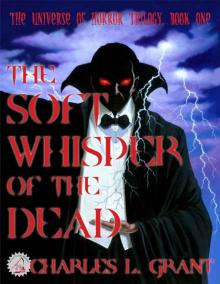 The Universe of Horror Volume 1: The Soft Whisper of the Dead (Neccon Classic Horror)
The Universe of Horror Volume 1: The Soft Whisper of the Dead (Neccon Classic Horror)![[Oxrun Station] Dialing The Wind Read online](http://i1.bookreadfree.com/i/03/19/oxrun_station_dialing_the_wind_preview.jpg) [Oxrun Station] Dialing The Wind
[Oxrun Station] Dialing The Wind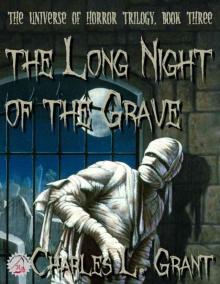 The Universe of Horror Volume 3: The Long Night of the Grave (Neccon Classic Horror)
The Universe of Horror Volume 3: The Long Night of the Grave (Neccon Classic Horror)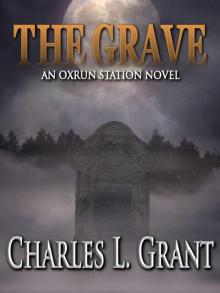 The Grave - An Oxrun Station Novel (Oxrun Station Novels)
The Grave - An Oxrun Station Novel (Oxrun Station Novels)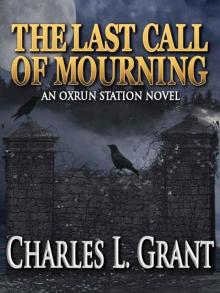 The Last Call of Mourning - An Oxrun Station Novel (Oxrun Station Novels)
The Last Call of Mourning - An Oxrun Station Novel (Oxrun Station Novels)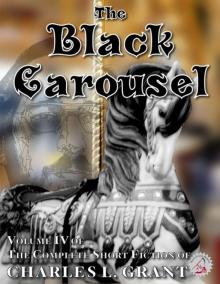 The Complete Short Fiction of Charles L. Grant, Volume IV: The Black Carousel
The Complete Short Fiction of Charles L. Grant, Volume IV: The Black Carousel The Bloodwind - An Oxrun Station Novel (Oxrun Station Novels)
The Bloodwind - An Oxrun Station Novel (Oxrun Station Novels)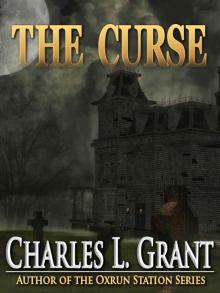 The Curse
The Curse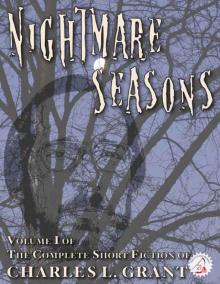 The Complete Short Fiction of Charles L. Grant Volume 1: Nightmare Seasons (Necon Classic Horror)
The Complete Short Fiction of Charles L. Grant Volume 1: Nightmare Seasons (Necon Classic Horror)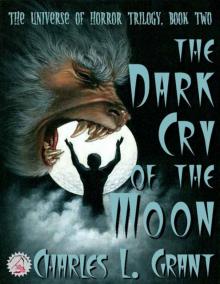 The Universe of Horror Volume 2: The Dark Cry of the Moon (Neccon Classic Horror)
The Universe of Horror Volume 2: The Dark Cry of the Moon (Neccon Classic Horror)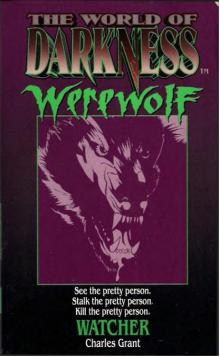 Watcher: Based on the Apocalypse (World of Darkness : Werewolf)
Watcher: Based on the Apocalypse (World of Darkness : Werewolf)![[Oxrun Station] The Bloodwind Read online](http://i1.bookreadfree.com/i/03/25/oxrun_station_the_bloodwind_preview.jpg) [Oxrun Station] The Bloodwind
[Oxrun Station] The Bloodwind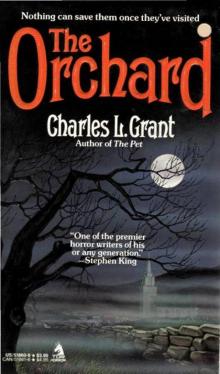 The Orchard
The Orchard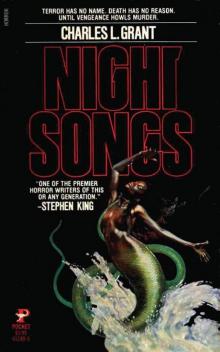 Night Songs
Night Songs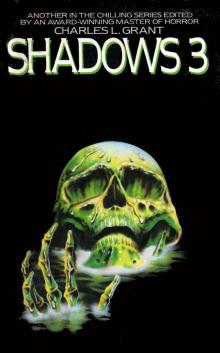 Shadows 3
Shadows 3![Symphony - [Millennium Quartet 01] Read online](http://i1.bookreadfree.com/i1/04/02/symphony_-_millennium_quartet_01_preview.jpg) Symphony - [Millennium Quartet 01]
Symphony - [Millennium Quartet 01] The Hour of the Oxrun Dead (Necon Classic Horror)
The Hour of the Oxrun Dead (Necon Classic Horror)![In the Mood - [Millennium Quartet 02] Read online](http://i1.bookreadfree.com/i1/03/31/in_the_mood_-_millennium_quartet_02_preview.jpg) In the Mood - [Millennium Quartet 02]
In the Mood - [Millennium Quartet 02]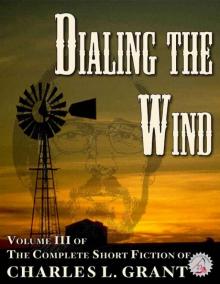 The Complete Short Fiction of Charles L. Grant Volume 3: Dialing the Wind (Neccon Classic Horror)
The Complete Short Fiction of Charles L. Grant Volume 3: Dialing the Wind (Neccon Classic Horror)![[Oxrun Station] The Last Call of Mourning Read online](http://i1.bookreadfree.com/i2/04/05/oxrun_station_the_last_call_of_mourning_preview.jpg) [Oxrun Station] The Last Call of Mourning
[Oxrun Station] The Last Call of Mourning The Pet
The Pet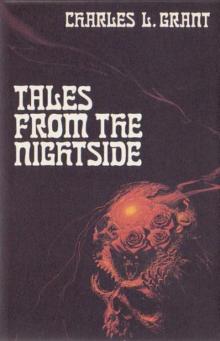 Tales from the Nightside
Tales from the Nightside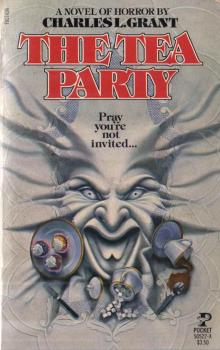 The Tea Party - A Novel of Horror
The Tea Party - A Novel of Horror The Complete Short Fiction of Charles L. Grant Volume 2: The Orchard (Necon Classic Horror)
The Complete Short Fiction of Charles L. Grant Volume 2: The Orchard (Necon Classic Horror) Whirlwind
Whirlwind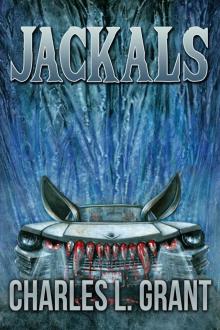 Jackals
Jackals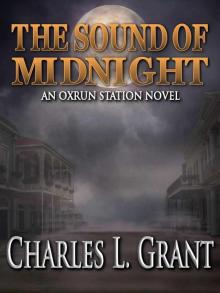 The Sound of Midnight - An Oxrun Station Novel
The Sound of Midnight - An Oxrun Station Novel